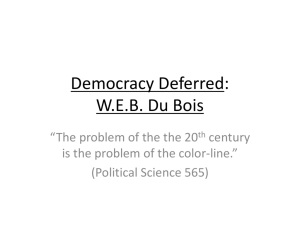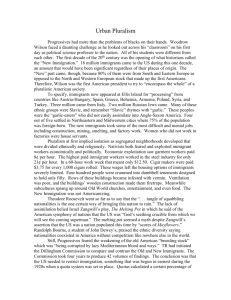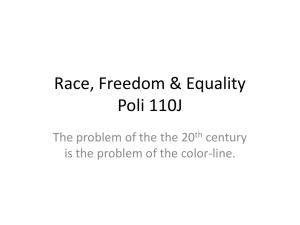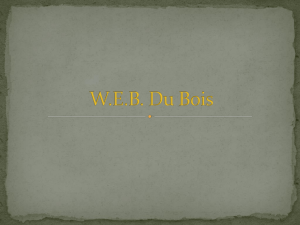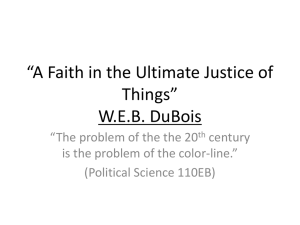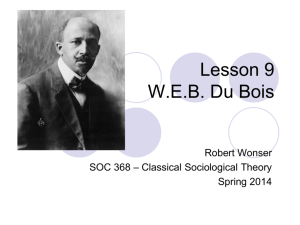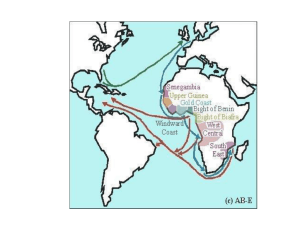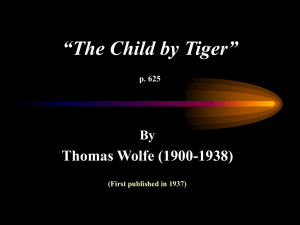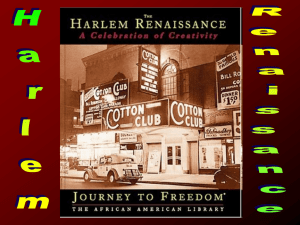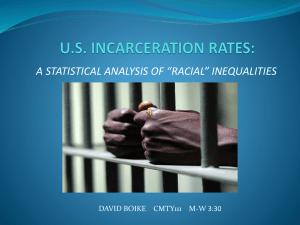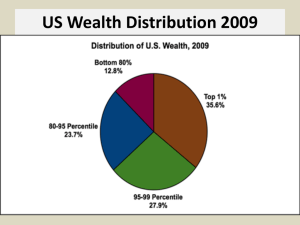Race, Power, & Equality Poli 110J 7.1
advertisement
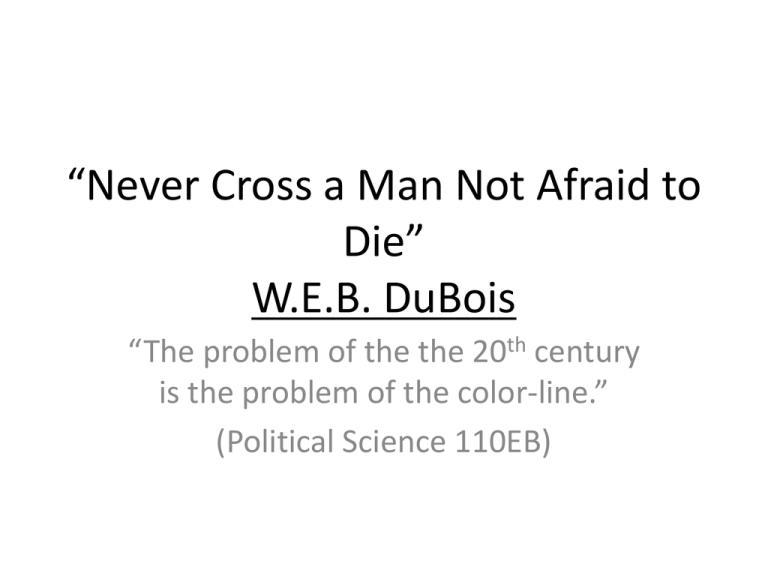
“Never Cross a Man Not Afraid to Die” W.E.B. DuBois “The problem of the the 20th century is the problem of the color-line.” (Political Science 110EB) W.E.B. Du Bois • • • • • 1868-1963 First black PhD at Harvard Pan-Africanist Radical (equality) Publisher of NAACP’s The Crisis • Communist – MLK: “It is time to cease muting the fact that Dr. Du Bois was a genius and chose to be a Communist.” 2 Du Bois gets radicalized • Sam Hose (1899) – Accused of murdering employer & raping his wife – Admits murder (over debt, possibly in self-defense), denies rape – Lynched w/2,000 witnesses outside of Atlanta – Emasculated, face skinned, tied to a tree and burned alive. Knuckles displayed for sale in shop window. – Lynching a communal activity – Du Bois comes to believe that “one could not be a calm, cool, and detached scientist while Negroes were lynched, murdered, and starved.” 3 Major Themes • • • • The Veil Double-consciousness Race consciousness Racial essentialism 4 Race Consciousness • “How does it feel to be a problem?” (7) – American society consistently and irresistibly forces awareness of one’s own blackness – Blackness is not a quality of appearance, but of identity • Not just what the individual looks like, but who the individual is – Blackness is a “problem” 5 The Problem of the Color Line • The problem of the twentieth century is the problem of the color-line,--the relation of the darker to the lighter races of men in Asia and Africa, in America and the islands of the sea.” (15) – Not geographical, but a “line” nonetheless. – A notably American (and to a lesser extent, European) way of looking at the world. • “Then it dawned upon me with a certain suddenness that I was different from the others; or like, mayhap, in heart and longing, but shut out from their world by a vast veil.” (8) – Parallel worlds – Restrictive only to blacks, who cannot move beyond the veil, while whites can move back and forth. • Privilege. 6 The color line • The American world “yields him no true selfconsciousness, but only lets him see himself through the revelation of the other world. It is a peculiar sensation, this double-consciousness, this sense of always looking at one’s self through the eyes of others” • “One ever feels his two-ness,--an American, a Negro; two souls, two thoughts, two unreconciled strivings; two warring ideals in one dark body, whose dogged strength alone keeps it from being torn asunder.” (8) – Internal division on the color line – Partly self, partly not-self – Constant internal conflict 7 The color line • Blacks exist in some sense on both sides of the color line – “He would not Africanize America, for America has too much to teach the world and Africa. He would not bleach his Negro soul in a flood of white Americanism, for he knows that Negro blood has a message for the world.” • Essentialism – Partly inherent, partly historical • “He simply wishes to make it possible for a man to be both a Negro and an American, without being cursed and spit upon by his fellows, without having the doors of Opportunity closed in his face. – “to merge his double self into a better and truer self.” (9) 8 The Color Line • Three parties in Civil War: North, South, Blacks – Freedman’s Bureau constitutes a separate government for liberated slaves • Du Bois on Imperial Japan vs. China • The “blighted, ruined form” of the post-War white “with hate in his eyes” vs. the “form hovering dark and mother-like, her awful face black with the mists of centuries” who had raised his children, buried his wives, and slaked his lust (25) – Metaphor: male & female – “The South believed an educated Negro to be a dangerous Negro” 9 What is to be done From birth till death enslaved; in word, in deed unmanned! .... Hereditary bondsman! Know ye not Who would be free themselves must strike the blow? -Byron (33) 10 Booker T. Washington • 1856-1915 • Support from white establishment in North & South • Some support from black leaders – “Leader not of one race but of two” (38) • Advocated assimilation (as does Du Bois), recognition of political & social realities of the South, modus vivendi w/Southern whites – After the War, North & South looked to re-join as a single nation, diminishing patience for the question & fate of blacks in both Sections 11 Booker T. Washington • Washington insists that to advance, blacks must give up hopes for – Political power – Insistence on civil rights – Higher education • In return for – Peace – Industrial schooling • An issue of practicality: believed blacks would benefit most from trade school rather than liberal education – Example: disapproval of poor black boy trying to learn French – Long-term assimilation & advancement 12 Booker T. Washington • In short order, he gets – Black disenfranchisement – Jim Crow laws • Legal inferiority • Example, OK: literacy requirement, unless you were eligible to vote before 1866 – Abandonment of blacks by institutions of higher learning 13 Du Bois’ Criticisms • Washington wants to advance black business, but how can this be done without the right to vote in your own interests? • Insists on thrift & self-respect, but also on “unmanly” submission to whites • Advocates elementary & industrial school, but who will teach at black schools if blacks can’t get higher education? – Imagining a different world 14 3 bad consequences • 1. South is justified in despising blacks because of blacks’ current degradation – They are in Washington’s depiction ignorant and slothful, not quite up to par with whites & have to catch up • 2. Cause of this degradation is the wrong education in the past • 3. Idea that the future of blacks in America depends primarily on their own efforts 15 • These are “Dangerous half-truths” for Du Bois – 1. What about slavery and systematic exclusion from politics, economy, society? – 2. black schooling lagged because it had to wait for first generation of black teachers – 3.While blacks must work for their own improvement, Du Bois argues that they must be assisted and encouraged “by the initiative of the richer and wiser environing group” (whites) (43) • Is this problematic? 16 • Du Bois & NAACP insist on more militant, though still peaceful, position, demanding – Right to vote – Civic equality – Education of youth according not to race, but ability • In essence, Du Bois accuses Washington of apologizing and covering over for systematic racism, making it appear as if the disadvantaged position of American blacks has nothing to do with whites and everything to do with blacks. 17 • “By every civilized and peaceful method, we must strive for the rights which the world accords to men, clinging unwaveringly to those great words which the sons of the Fathers would fain forget: ‘We hold these truths to be self-evident…’” (44) 18 Education • Can blacks be educated? • “Most Americans answer all queries regarding the Negro a priori, and that the least that human courtesy can do is listen to evidence.” (70) – Note: not most white Americans – Basic assumptions as part of the Veil 19 Why is education necessary? • This segregation is reinforced the places that blacks & whites live • Either they live in proximity, encountering one another at their worst, or whites own black homes but never encounter their tenants – “…the family of the [former] master has dwindled to two lone women, who live in Macon and feed hungrily off the remnants of an earldom.” (86) • Relatedly, uneducated blacks are often victimized in business by outsiders. They can own nothing themselves. – Debt: repossession and exploitation • Deeper and deeper year by year – Whites, Yankees, Jews – Antisemitism 20 Permanent Alienation • Thus, two attitudes come to the forefront: • Disengagement: “Happy?—Well, yes; he laughed and flipped pebbles, and thought the world was as it was. He had worked here twelve years and has nothing but a mortgaged mule. Children? Yes, seven; but they hadn’t been to school this year,-couldn’t afford books and clothes, and couldn’t spare their work.” (89) 21 Permanent Alienation • Resentment: “Let a white man touch me, and he dies; I don’t boast this,--I don’t say it around loud, or before the children,--but I mean it. I’ve seen them whip my father and my old mother in them cotton-rows till the blood ran” – “Careless ignorance and laziness here, fierce hate & vindictiveness there;--these are the extremes of the Negro problem which we met that day, and we scarce knew which we preferred.” (89) 22
